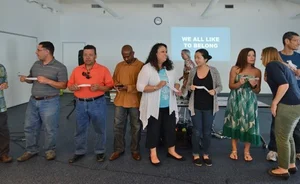
What We Do

Consultation
Perhaps the most frequent way that Commission staff members serve the constituents of Los Angeles County is through the process of consultation. We listen, observe, ask questions, and gather information in order to advance thorough, accurate understanding, and identify needs and expectations. We offer perspective, suggest alternatives, recommend methods, and help to identify resources for implementing targeted, effective action. Through this process we are able to customize our responses to specific situation.
Assessment
Much of our behavior in interacting with each other is based on assumptions or conclusions that have not been thoroughly verified. Very often Commission staff members help by gathering, verifying, and disseminating accurate information about events or social networks affecting or even threatening relations in a community or between groups.
Since 1980, our assessment efforts have included an annual report that compiles and analyzes hate crime data submitted by sheriff and city police agencies, educational institutions, and community-based organizations. This yearly review is one of the longest-standing reports in the nation documenting hate crime. It has been disseminated broadly to policy-makers, law enforcement agencies, educators, and community groups throughout the county and across the nation in order to better inform efforts to prevent, detect, report, investigate, and prosecute hate crimes. In addition, we document cases of hate, including those that do not involve criminal activity, reported to 211LA.
Training
For many of us, our personal styles and patterns of interacting with others, along with our attitudes and prejudices, are largely subconscious. Commission staff members frequently are called on to lead learning experiences that help people see the need for justice, adopt attitudes of mutual acceptance, respond productively to conflict, manage implicit bias, and learn the art and science of intercultural collaborative relationships. We provide training in a wide variety of settings, including schools, community groups, businesses, and nonprofit organizations, as well as law enforcement and government agencies.
Coalition-Building
Human relations issues of concern to one group frequently are problematic for other groups as well. So, frequently, more than one group is working on the same issue or situation. Far too often, however, groups are not working together. In order to take the fullest possible advantage of the various experiences, skills, and resources of different groups, we work to bring stake holders together. We help them craft feasible structures for working together to produce synergistic impact through collaborative dialogue and initiative.